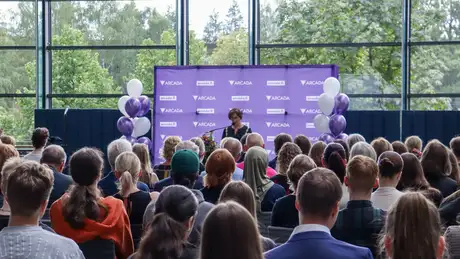The future and hidden potential of online events By Essi Saarto
Published: 19.05.2021 / Education / Event / Student life / Blog
Due to the heavy impact of COVID-19 pandemic on the event management industry, I wanted to conduct a research on online events. Prior to 2020, relatively many pessimistic views on online events dominated the scene. While several of those sceptical opinions remain, as the general public have been more and more exposed to the online event experience, they have discovered the positive aspects of attending an event online. Especially with international congresses (which is the focus of this research) these benefits include significant cost savings, when money is saved on travel and accommodation, and the reduced environmental impact. Personally, I find the most positive characteristic of online events to be their inclusiveness – online events enable more people participating and increase the accessibility of the event. Participants can attend despite of visa-restrictions, family constrains or busy schedules etc. I wanted to bring to light, what the successful online participant experience consists of. It can be argued, the elements discovered are not significantly different to the elements of the physical event participation experience and the findings of this research could even be beneficial to the organisers of onsite events also.
My thesis research focuses on international scientific events, mostly annual medical congresses, which were organised as online events for the first time in 2020. Out of the eight events chosen for this research, in almost every case the decision to go online was taken in a relatively short time span (because of the global pandemic). To analyse the elements impacting the participant experience in the eight event cases, I used descriptive research method, which asks the question “what does this consist of?”. The participants of these eight events are used to attending these events regularly onsite in a physical event venue. This causes that the participants, along with the organisers, are subject to comparing the online event to the “normal” physical event version, which created a limitation for this study. As part of the conclusions, my thesis states that an online event’s success should not be compared and evaluated against the physical, onsite event success. The reasoning behind this claim is that the psychological and concrete experience of attending an event online is pivotally different from the traditional setting of attending an event online.
During the analysis process, I found myself making comparisons between online and onsite events and trying to implement elements from the onsite events to online events. I became aware how my own thinking caused an additional limitation to analyse the results truly objectively. In the ideal context, it would be possible to design and create online events in a “vacuum”, without the shadow of onsite events. This way, it might be possible to come up with truly ground-breaking ideas to take online events to a “new level” where their added values can be highlighted.
The process of writing this thesis has taught the author how much “hidden potential” there is still to discover with online events and how the comparison to onsite events can hinder this potential from shining. In this sense, this discussion could be contrasted to vegan food – is vegan food as its best when it aims to “replicate” non-vegan options (such as cheese or meat) or when it is aiming to create its own route? Should vegan food develop as independently as possible in order to fulfil its full potential and create new innovative cuisines where vegan food is at its tastiest? Naturally, it is always a matter of personal perceptions. When it comes to congresses, some participants are yearning travel, face-to-face contact, and the physical learning experience more than others.
My hope is that this thesis encourages those who are sceptical towards online events to see the potential online events can offer (flexible participation, ease of access, cost savings etc.). This research is relevant for the MA in Media Management as online events/online components of events will prevail and evolve as part of the wider development of online platforms, applications, and communication solutions. Optimistically, this research inspires further creativity when it comes to designing the online event experience with the help of online tools.
It will be exciting to see how online events will continue to improve and develop in the 2020s and especially how professional congresses will meet the needs of participants with distinct inclinations – perhaps hybrid events will become the most common congress format.


